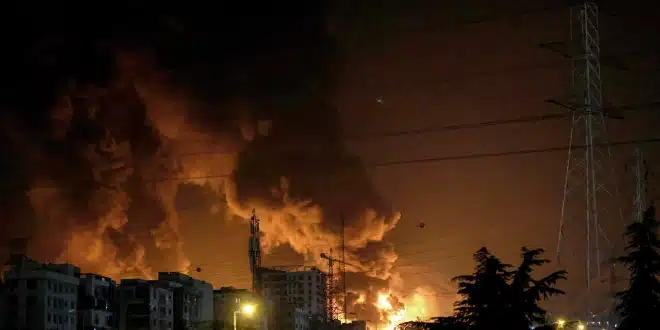Senior Iranian leaders are warning that the tense lull in fighting with Israel could collapse at any moment, insisting the region is still locked in a state of war. First Vice President Mohammad Reza Aref described the situation on Monday as a “cessation of hostilities” rather than a formal ceasefire, cautioning that both sides must remain ready for renewed confrontation.
“We must be prepared at every moment for confrontation,” Aref said, underscoring that no binding agreement exists to halt the violence.
The remarks come just weeks after June’s intense 12-day conflict, which saw Israel target Iranian nuclear facilities, military installations, and even residential areas. More than 1,000 people were killed, including senior military commanders and nuclear scientists. In retaliation, Iran launched a series of missile and drone strikes into Israeli territory, causing dozens of casualties.
U.S. Involvement and the Uncertain Truce
The United States entered the conflict late in June, striking Iranian nuclear sites before announcing that hostilities had paused on June 24. However, unlike past ceasefires, no official framework or agreement was signed. The absence of clear terms leaves the truce precarious, with Iranian officials repeatedly stressing that escalation could resume without warning.
On Sunday, Yahya Rahim Safavi, a top military adviser to Supreme Leader Ayatollah Ali Khamenei, emphasized this uncertainty. Speaking to Iranian media, he described the situation as a “war phase” without protocols, rules, or commitments between Iran, Israel, and the United States. “A ceasefire means ceasing attacks; that could change at any time,” Safavi warned, adding that Tehran is actively planning for “the worst-case scenario.”
Nuclear Program at the Center of Tensions
At the heart of the dispute lies Iran’s nuclear program, which Western governments suspect is being advanced toward weapons development—an allegation Tehran firmly rejects. Following June’s fighting, both Israel and the United States have threatened further strikes if Iran resumes nuclear enrichment activities at its damaged facilities.
The International Atomic Energy Agency (IAEA) has highlighted growing concerns, noting that Iran remains the only non-nuclear-armed state enriching uranium up to 60 percent—well above the 3.67 percent cap set by the 2015 Joint Comprehensive Plan of Action (JCPOA). While not weapons-grade, this level is only a short step from the 90 percent threshold required for a nuclear bomb.
In response, European powers that helped broker the 2015 deal—Britain, France, and Germany—have warned they may reimpose sanctions lifted under the accord. Tehran, for its part, has signaled that continued pressure could push it to withdraw from the Nuclear Non-Proliferation Treaty (NPT), a move that would mark a dramatic escalation in global security risks.
What Lies Ahead
Iranian officials maintain they are not seeking a new war but insist they will defend the country if attacked again. The combination of an undeclared truce, the absence of formal diplomatic channels, and unresolved disputes over nuclear enrichment leaves the Middle East in a volatile state.
As both sides brace for possible escalation, the coming weeks may determine whether the current pause holds—or whether the conflict reignites with even greater intensity.


